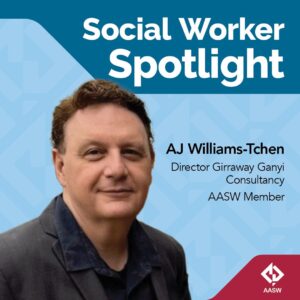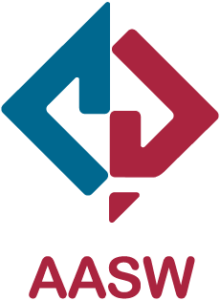Social Worker Spotlight – A.J. Williams-Tchen
- Home
- »
- Social Worker Spotlight
- »
- Social Worker Spotlight – A.J. Williams-Tchen

A.J. Williams-Tchen is a social worker, educator and cultural mentor whose work bridges personal experience with professional purpose. With a background in nursing and a deep commitment to social justice, he has spent more than two decades advocating for culturally safe practice, particularly in health and education settings. Through consultancy, mentorship and national recognition, A.J. continues to challenge systems, elevate First Nations voices and reframe the role of social work in healing intergenerational trauma.
It wasn’t just a career choice, it was personal. “My biological family had been through the welfare system for generations. I knew I wanted to create systemic change and give voice to those who are so often unheard, especially First Nations people.”
His path began in nursing, but the leap to social work felt natural. Working in hospital settings, he noticed something striking: many health professionals had little cultural understanding when caring for Aboriginal patients and Torres Strait Islander patients. “I wanted to change that. I wanted to help others provide culturally safe care, not just tick a box.”
It was this conviction that led him to found Girraway Ganyi Consultancy in 2008, named for his children, ‘Girraway’ (Goanna in Wiradjuri) and ‘Ganyi’ (Echidna in Wotjobaluk). Through the consultancy, he has created and delivered programs in Aboriginal cultural awareness, mental health first aid, mentoring for Aboriginal health professionals and students, and Reconciliation Action Planning. He’s also a podcaster, his YarninBlak’ series has reached over 110 episodes, sharing honest stories of First Nations people from all walks of life.
A.J. is also A Swinburne University alumni.
A pivotal moment came while working at an Aboriginal Gathering Place in Melbourne’s western suburbs. He discovered that of 34 local HACC services, not one had received cultural awareness training. “That was when I realised, I couldn’t wait for systems to change. I had to be part of creating the tools myself.”
His impact is not only felt in training rooms and classrooms, but also in the lives of those he mentors. For nearly a decade, he’s worked with schools like Scotch College, supporting First Nations students through tailored cultural mentoring. “It means so much when young people stay in touch after they graduate, when they choose to keep you in their lives. That tells me we’ve built something meaningful.”
One really proud moment that he highlights was seeing a former mentee recognised as Young Victorian Australian of the Year. “He told me the time we spent together partly shaped who he became. That’s everything.”
But the work doesn’t come without challenges. He names systemic disadvantage, lack of trauma-informed understanding, and reactive health services as some of the biggest hurdles. “We still see huge gaps in life expectancy, justice, and education. Social workers are in these spaces, but the trauma we’re addressing is recent and ongoing.”
Recognition for his efforts has been widespread. He’s a 2021 AASW Aboriginal Social Worker of the Year, a 2023 Allied Health Social Worker of the Year, and a 2025 Fellow of the AASW. He’s also a Victorian Australian of the Year nominee, a Humanist of the Year, and has won NAIDOC Awards for ‘Community Spirit & Self Resilience’ and for ‘Health & Well-being’ and a multiple-time alumni award recipient from Victoria and Swinburne University.
Even with these accolades, he remains grounded in reflection and growth. “I make mistakes. I’m human. But I reflect constantly, through journalling, writing poetry, and publishing professional pieces. It keeps me honest and evolving.”
His advice for social workers entering the Aboriginal health space is clear and unapologetic:
“Understand how recent our history is. Learn what cultural safety and allyship really mean. And admit you don’t know everything, because that’s where real learning starts.”
He’s vocal about the ways social work is misunderstood, particularly in Aboriginal communities. “We’ve got a painful legacy connected to child removal, past and present. For many, that’s still all social work represents. I want to show that there’s more: advocacy, mentorship, education, healing.”
Looking to the future, he’s hoping to undertake further study and continue pushing for change. “Social work needs to be seen as equal in the health space. We are more than crisis responders. We are change-makers, educators, and therapists.”
And to anyone unsure about the scope of social work, he leaves a simple message: “Don’t underestimate what we do. Social workers, and especially First Nations social workers carry both professional skill and lived experience. That combination is powerful.”

